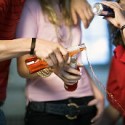A Look at the Types of Therapy Offered in Drug Treatment Centers
Licensed counselors and therapists work on both an individual and group basis with patients in drug treatment centers. Various types of therapy are offered to help the recovering addiction heal physically, socially, psychologically and emotionally from their addiction and from their past. Although not all types of therapy are effective for every addict and not all types of therapy are necessary, drug treatment centers do offer a range of therapy options in an effort to provide the maximum benefit to the most people. Here’s a look at some of the different types of therapy you can expect to find in drug treatment centers.
Individual Therapy
Individual therapy is a common type of therapy in drug treatment centers and provides patients and the therapist a chance to build a bond with one another. Individual therapy is very effective in treating those who suffer from dually diagnosed conditions such as an addiction to drugs or alcohol in conjunction with a mental disorder such as depression, anxiety or schizophrenia.
Group Therapy
Group therapy is usually the foundation for most effective drug treatment programs. This type of therapy provides recovering addicts with a safe environment where they can work with others in recovery to develop goals and plans for recovery, talk about their past or present experiences with addiction and treatment and work with peers. Group therapy allows addicts to challenge and support their peers in the recovery process.
Cognitive Behavioral Therapy
Cognitive behavioral therapy helps patients to recognize the moods or thoughts that occur which result in them using drugs or alcohol. In this type of therapy, the recovering addict leans how to avoid the thoughts or feelings that cause them to use by changing their cognitive thinking which results in changed behaviors. Such therapy is very useful for a range of addictions as well as many mental health disorders including anxiety.
Contingency Management Therapy
Contingency management therapy is like a rewards program for addicts. Similar to a sticker chart that is used for young children who perform well at school, contingency management therapy gives recovering addicts with incentives to stay clean. These incentives may include special privileges in drug treatment such as outings or special meals or they may include gift cards to a favorite store. Unfortunately, this type of therapy is not always successful because once the therapy stops the individual will no longer receive the incentive to stay clean which is likely to result in relapse, a common occurrence for many addicts.
Family Therapy
The bond between families can be a very therapeutic for the recovering addict when this bond is properly nurtured and the families are aware of their role in the recovery process. Family therapy provides a chance for the family members of those in recovery to get help and support. This type of therapy has been proven to be especially helpful for children of those addicted to drugs or alcohol and can reduce the resentment or other negative feelings that may result from the addiction of a loved one.
Maintenance Therapy
Another type of therapy that is commonly used in drug treatment centers in called maintenance therapy. This type of therapy is a long-term approach that helps the recovering addict to continue their recovery. Maintenance therapy may include long-term counseling and follow up care as well as various medications depending on the individual and their unique needs. Studies show that maintenance therapy can greatly increase the chances of an addict making a successful recovery without relapse.
